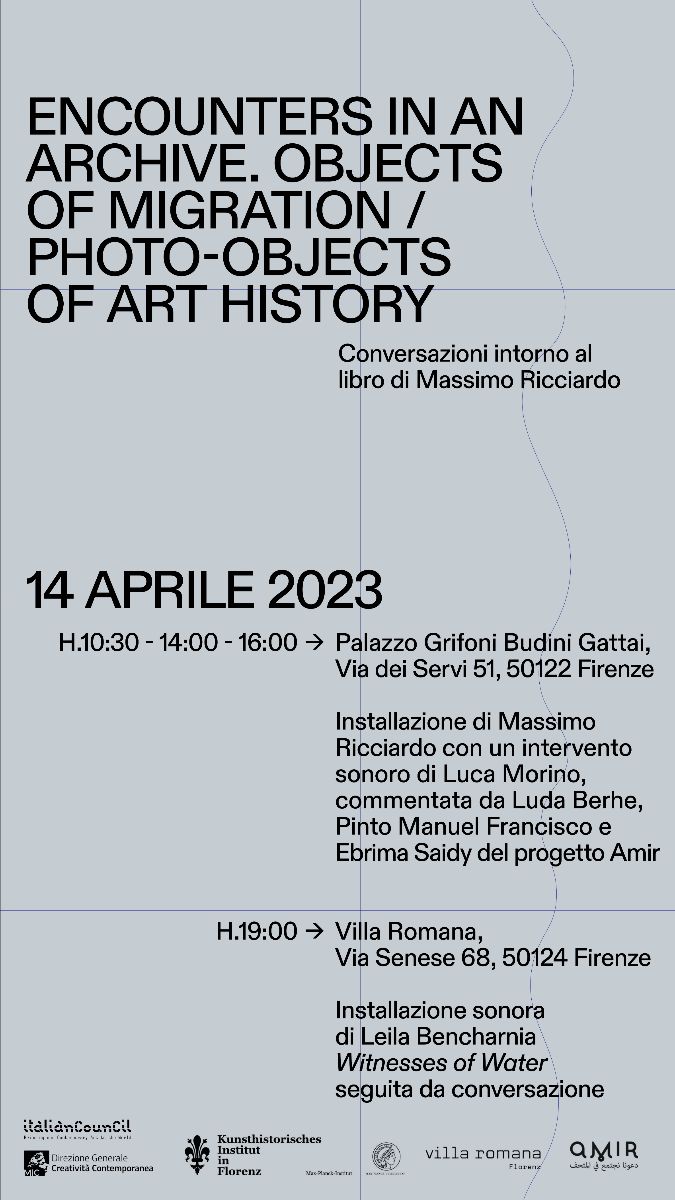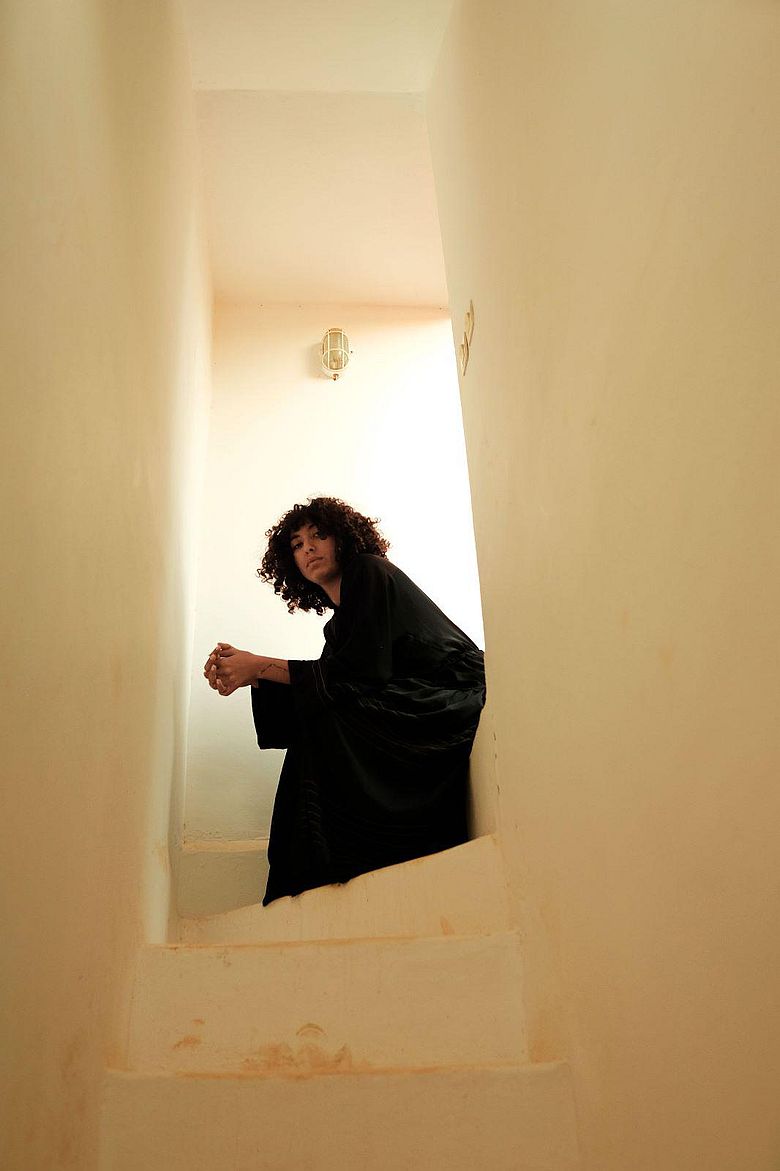Veranstaltungen
14.04. 2023
Encounters In An Archive.
Objects of Migration/Photo-Objects of Art History
Kunsthistorisches Institut in Florenz – Max-Planck-Institut and Villa Romana present:

Join us tomorrow from 7pm at Villa Romana for an evening hosted in collaboration with the Kunsthistorisches Institut in Florenz! The event celebrates the publication of Massimo Ricciardi’s book Encounters In An Archive. Objects of Migration/Photo-Objects of Art History edited by Costanza Caraffa and Almut Goldhahn.
The release of the book has been accompanied by a series of events in Italy and Europe, which tomorrow Friday 14 April will also make a stop in Florence. At the Fototeca of the Kunsthistorisches Institut in Florenz the installation from which the project originated will be opened again to the public, accompanied by a sound installation created by the artist in collaboration with sound designer Luca Morino in the staircase of Palazzo Grifoni Budini Gattai. Guided tour will be offered by Luda Berhe, Pinto Manuel Francisco and Ebrima Saidy, mediator and cultural mediators from Amir (www.amirproject.com). The Amir project (Accoglienza Musei Inclusione Relazione) proposes since 2018 in Florence and Fiesole museum visits and urban walks led by people with a migrant background.
The guided tours in Italian language will be held at 10.30 a.m., 2 p.m., 4 p.m. (free entrance with reservation at fototeca@khi.fi.it).
On the same day, at 7 pm as mentioned above, Villa Romana and the Kunsthistorisches Institut in Florenz invite you to a joint initiative on the occasion of the reactivation of the project in Florence.
Since a few years, Villa Romana and its previous director has been in dialogue with the Fototeca of the KHI and the artist Massimo Ricciardo. Tomorrow, on the occasion of the reactivation of the project in Florence, Villa Romana hosts a listening session by artist and cultural worker Leila Bencharnia and a collective discussion. Few days after the n-th tragedies in the Mediterranean, Villa Romana feels the urge to articulate a deeper reflection on the thanatopolitics of water migration. Opening up a space of listening and conjuring a moment of loud silence, Leila Bencharnia and Villa Romana formulate a response to a project they feel in need of troubling. Articulating a reflection on the radical need to shift the narrative on migration and to hold the discourse from a different positionality and situated perspective, they call and invite the listeners to mourn and experience sonically, through their bodies, before even embracing the possibility of a rational reflection. With Witnesses of Water, a 40 minutes-long sound piece and sonic experience, and a subsequent conversation on the power/violence of archives and of taxonomies, Bencharnia asks us to ponder the following: "The artist (Ricciardo) writes that the objects he collects have been silent witnesses of life-threatening crossings". Does bringing these objects to "the archive" and to an art network break any of this silence? There is an extended violence that happens when the objects are removed from their context and transposed into the diluted setting of a cultural institution. (…) What does it do other than sustaining an image of the migrant always as victim, where the decision to put yourself in water to be free is only understood through othering narratives?"
A collective reflection and conversation with the artist, the fellows, and the team of Villa Romana, together with Massimo Ricciardo, Costanza Caraffa, Almut Goldhahn and the cultural mediators Luda Berhe, Pinto Manuel Francisco and Ebrima Saidy of the Amir project, will follow.
After the discussion, Egusi and other Nigerian delicacies will be served.
You are more than welcome to come and participate!
Leila Bencharnia is a sound artist, acousmatic interpreter and musician based in Milan. Daughter of a traditional Moroccan musician, her passion for music begins in the western desert of Morocco where she grew up. Her sonic surroundings is made out of analogic material, such as tapes, vinyls, and synthesizers. She uses the practice of listening as a modality of knowledge transmission. Bencharnia’s practice seeks to have an active role in the decolonizing of listening as a way to have a visible impact on social and political questions. She is also part of the Archive Ensamble.
Massimo Ricciardo (Darmstadt, 1979) is an artist living and working in Turin. He studied painting and graphics at the Academy of Fine Arts in Florence and the University of Applied Sciences in Potsdam. His artistic research focuses mainly on the personal and collective memories of refugees and their journeys to Europe, relying mainly on archive material: photographs, objects, sounds, amateur videos and stories. Ricciardo contributes with his research to a process of creating a new „living memory”. He is the winner of several nationwide competitions including Cantica21, Italian Contemporary Art Everywhere (2020), and Italian Council X - General Directorate for Contemporary Creativity of the Ministry of Culture (2021).
The Kunsthistorisches Institut in Florenz (KHI) is a history of art and architecture research institute embracing a transcultural and plural perspective. Founded in 1897, it has been part of the Max-Planck-Gesellschaft. The KHI's research projects touch on some of the most pressing contemporary global challenges: urbanism, ecology, cultural heritage, the anthropocene, museum systems. This breadth of topics is reflected in a variety of methodological approaches that cross-fertilise each other, bringing innovation and critical spirit in all areas of art-historical research. The Institute supports young international scholars and is structured in departments and research groups. One of these is the Photo Library. Thanks to numerous initiatives conferences and publications, the KHI constitutes an international hub for those questioning the present and future of art history.
The Fototeca of the Kunsthistorisches Institut in Florenz is one of the most important archives of photographic documents on Italian art and architecture. It is also an established research centre and a laboratory active to support international and transdisciplinary debate on the role of photographic archives in research and societies of the 21st century. The Photo Library is an ecosystem in which the work of the archive is inseparable from the scientific activities. Its research projects, methodologically rooted in material culture studies, create connections between the photographic archive and contemporary social and political issues such as cultural heritage and migration. The Photo Library is active in international networks and collaborates with artists such as Guido Guidi, Armin Linke and Akram Zaatari, producing books and exhibitions.
Join us tomorrow from 7pm at Villa Romana for an evening hosted in collaboration with the Kunsthistorisches Institut in Florenz! The event celebrates the publication of Massimo Ricciardi’s book Encounters In An Archive. Objects of Migration/Photo-Objects of Art History edited by Costanza Caraffa and Almut Goldhahn and supported by the Italian Ministry of Culture, Italian Council X – 2021
Leila Bencharnia


